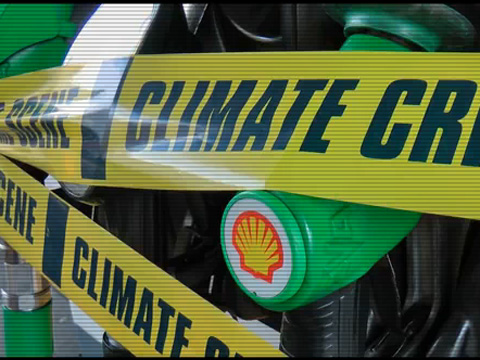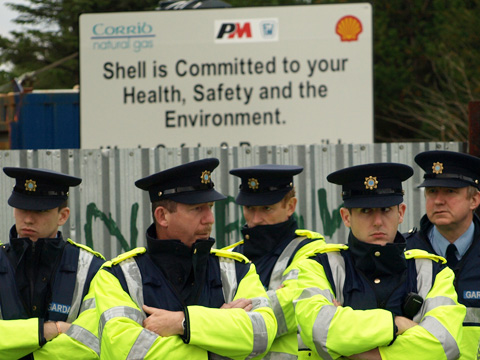M&S boasts of its 'sustainable' ambitions yet has a partnership with the oil company BP
Britain’s biggest and most ethical companies have been forming increasing numbers of partnerships with some of the world’s most environmentally questionable organisations.
Marks and Spencer, which aims to become ‘the world’s most sustainable major retailer’, has a partnership with, BP, the company responsible for one the world’s largest ever oil spills in the Gulf of Mexico in 2010.
Waitrose, part of the John Lewis Partnership, aims to actively look for ‘opportunities to improve the environment and to contribute to the wellbeing of the communities’ in which they trade, has recently formed a partnership with Shell. In 2008, the oil company accepted full liability for two massive oil spills that devastated a Nigerian community at Bodo in Ogoniland.
Another major British retailer with an ethical outlook, the Co-operative, which recently bought out Somerfield, has inherited a partnership with Texaco. Chevron, bought by Texaco in 2001, is responsible for millions of gallons of crude oil and toxic waste polluting 1,700 hectares of the Amazon rainforest.
Greg Muttitt, campaigns and policy director at international development charity War on Want, said: 'People believe there is an ethical option. The fact these companies are doing deals with unethical businesses shows how limited their ethical commitments are. This will wake people up to how these companies’ ethical policies are only skin deep.'
BP and M&S join forces
M&S and BP’s partnership started in 2005 and there are now 135 BP and M&S stores in the UK. The companies have formed a franchise agreement whereby M&S provides the products and BP picks up the property, staffing and running costs.
M&S launched Plan A in 2007, consisting of 180 commitments to achieve by 2015, including working to combat climate change, reduce waste, use sustainable raw materials and trade ethically. They state they are doing this because they believe it is now the only way to do business - there is no Plan B.
BP has been responsible for a number of other environmental disasters including, in 2006, the spillage of more than one million litres of oil in Alaska. BP is currently involved in extracting oil from tar sands in Canada which, according to Greenpeace, is the biggest industrial development on Earth destroying vast swathes of land, poisoning water supplies, displacing indigenous people and driving carbon emissions sky high.
In response to the contradictions of M&S’s Plan A and its partnership with a company with such a questionable environmental record, an M&S spokesperson, said: 'Our relationship is with BP Retail and we work closely with them on a number of aspects of Plan A, including waste management and community links. Good progress is being made in embedding Plan A into our franchise business. We do not work with any other part of BP and it is therefore not appropriate for us to comment on their activities.'
'Simply Food stores in BP forecourts are extremely popular with our customers and provide access to the M&S brand where otherwise we wouldn’t be able to have stores.'
Mr Muttitt, from War on Want said: 'Companies like M&S have done a very effective job at positioning themselves as ethical and people have been taken in by it. BP makes a business model out of cutting costs to the bone – that’s why it is involved in a disproportionate number of accidents around the world – and that’s the sort of company M&S want to partner with?'
Shell links up with Waitrose
In September, Shell and Waitrose opened two trial sites for a new joint venture, which sees Little Waitrose convenience branches on Shell petrol forecourts and also consists of combined marketing activities. Shell owns the sites and Waitrose has taken over the operation of each place, acting as Shell's agents for the sale of fuels.
A United Nations Environment Programme report in 2011 found irrefutable evidence of oil contamination from Shell, lasting 50 years ending in 1993, devastating people’s lives in the Niger Delta. It revealed the damage, in one of Africa’s most bio-diverse regions, to agriculture and fisheries has destroyed livelihoods, food sources and contaminated drinking water, exposing communities to serious health risks.
Mark Price, Waitrose managing director, said: 'Bringing Waitrose to more people in more places is a big priority for us and so I’m very pleased to be embarking on this new pilot with Shell. I think the combination of their offer and Little Waitrose will hold a lot of appeal for customers.'
Peter Frankental, Amnesty International UK’s economic relations programme director, said: 'When a supermarket chain enters into a high profile relationship with an oil company, then inevitably reputational issues will arise.
'Waitrose may well find their brand being sullied by an association with Shell, in particular with regard to the company's polluting activities in the Niger Delta.
'Conducting due diligence on the co-branding implications of a link-up with Shell would be a sensible move for Waitrose in light of public concerns around Shell's track record on human rights and the environment.'
A Waitrose spokesperson responded to the seeming contradictions noting: 'Waitrose takes our ethical commitments very seriously. While we don't think it's appropriate that we comment at length on Shell's business, we know they share concerns over the people of the Niger Delta, and they have informed us they are engaged on this subject with a variety of stakeholders.'
The Co-operative links to Texaco
The Co-operative Group’s social and sustainability goals are set out in its ‘Ethical Operating Plan’, which states it has a purpose beyond profit and that some things are "plainly unjust and need to be tackled, with or without a business case." It adds, "In the UK, we will continue to use our influence to campaign for a more sustainable world,” and states “we will continue to champion our human rights and trade policy, and as a matter of last resort curtail trade when called upon by the peoples of affected areas.”
Texaco has been accused of dumping billions of gallons of toxic waste in the Amazon poisoning rivers and streams in north-east Ecuador between 1964 and 1990 causing a catalogue of health problems including severe birth defects, spontaneous miscarriages and cancers in what local Ecuadorians have dubbed, ‘Rainforest Chernobyl’.
A spokesperson for the Co-operative Group responded to these seemingly intractable contradictions, arguing: 'Fuel at our Texaco-branded forecourts has been supplied by Valero since 1 August 2011 when Valero acquired the Texaco brand from Chevron.
'We no longer source any fuel from Texaco’s former parent company, Chevron.
'We have 219 forecourts, 150 of which are Texaco-branded. The vast majority of these were acquired when we bought Somerfield, and are subject to long-term commercial contracts, which will be reviewed at the appropriate time.
'We give close consideration to all our suppliers and any reviews of fuel sourcing are subject to full analysis.'
Graham Hales, CEO of leading brand consulting company Interbrand London commented on the consequences of Britain’s ‘ethical’ companies forming partnerships with ‘dirty’ businesses. He said at present the consumer is able to disassociate the brands – they don’t think about the link between the organisations – convenience overrides these issues.
Mr Hales said: 'What you are picking up on is inevitable with companies that present themselves as ethical. How you do business is as important as what you do.'
He warned against this being the status quo for those companies purporting to be ethical, especially in the increasingly global, rapidly changing, media savvy age we are living in. He said: 'Organisations have to respond to an agenda where they have to be more transparent. Brands are looking for consumers to approve of them and consumers are able to approve and disapprove of organisations, especially on the web.
'This is one to watch as organisations and consumers exercise their right of approval over brands.'
| READ MORE... | |
 |
NEWS ANALYSIS David v Goliath: Chevron plots to avoid cleaning up oil pollution in Amazon rainforest Ecuador government urged not to give in to pressure from the US oil giant Chevron to drop record $18 billion fine for its part in the 'Chernobyl of the Amazon' |
 |
NEWS Shell should clean up 'oil exploited' Niger Delta, says report Oil giant should stop gas flaring, provide clean drinking water and clean up the legacy of oil spills, polluted land and waterways in Niger Delta |
 |
VIDEO How to shut down a Shell petrol station... in style On 15th May, protesters shut down the Islington Shell petrol station for five hours in a non-violent, 'party at the pumps'. Watch the video to find out more... |
 |
NEWS ANALYSIS 'Underhand tactics and smear campaign' alleged over controversial Tesco store Following the clashes in Bristol outside a newly opened Tesco store, Robin Whitlock investigates how a long-running campaign against the supermarket giant was tarnished by images of violence and destruction |
 |
NEWS ANALYSIS The sleepy Irish village that challenged Shell over controversial pipeline A ten-year campaign opposing a Shell gas pipeline in a remote cornor of Ireland is documented in a major new film - The Pipe - and has become a focal point for a community's right to oppose corporations and central government |





